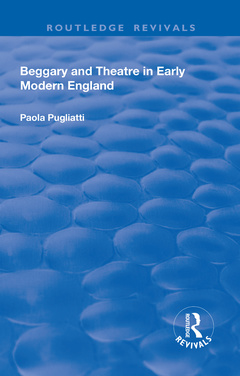Description
Beggary and Theatre in Early Modern England
Routledge Revivals Series
Author: Pugliatti Paola
Language: English
Approximative price 40.18 €
In Print (Delivery period: 14 days).
Add to cart
Beggary and Theatre in Early Modern England
Publication date: 10-2019
· Paperback
Publication date: 10-2019
· Paperback
Beggary and Theatre in Early Modern England
Publication date: 11-2017
· 15.4x23.4 cm · Hardback
Publication date: 11-2017
· 15.4x23.4 cm · Hardback
Description
/li>Contents
/li>Biography
/li>
This title was first published in 2003. In this new socio-cultural study of the history of the theatre in early modern England, author Paola Pugliatti investigates the question of why, in the Tudor and early Stuart period, unregulated and unlicensed theatrical activities were equated by the English law to unregulated and unlicensed begging. Starting with English vagrancy statutes and in particular from the fact that, from 1545 on, players were listed as vagrants, the book discusses from an entirely new perspective the reasons for the equation, in the early modern mind, of beggary with performing. Pugliatti identifies in players' aptitude for disguise and in the fear raised by their proteiform skills the issues which encouraged the assimilation of beggars and players; she argues that at the core of provisions against vagrancy was an attempt to marginalize people who, because of their instability in location and role (that is, in their theatrical quintessence), were seen as embodying potential for subversion. Placing the topic in a European context and relying on the reading of primary documents in several languages, Pugliatti discusses efforts to control beggary from Justinian's Codex to seventeenth-century statutes, locates the origin of anti-vagrancy and antitheatrical writings in anxieties about idleness and disguise, and analyzes the ways in which various kinds of representation demonized both beggars and players. Finally, by carefully distinguishing between the traditions of rogue pamphlets, conny-catching pamphlets and the picaresque, she offers fresh readings of a number of texts which appear to have been entirely disregarded by recent scholarship, such as pamphlets by Walker, Harman, Greene and Dekker.
Contents: Introduction: mendicitas et mendacia; The facts: Vagrancy and beggary in Europe; The legislation in England: The repression of vagrancy; Henry VIII: the interdiction of disguise; Edward VI: prophecy and sedition; Mary: 'lewd plays and players'; Elizabeth: the systematization of control; James I: the restriction of patronage and the hardening of censorship; Philosophical and religious perceptions and representations: Idleness: pigritia and pervagatio; Disguise, or, 'the vagrancy of the signifier': apparel as semiotic system; Disguise in the theatre: impersonation; Disguise in the theatre: cross-dressing; The 'Depe dissimulation' and the 'sclerous secrets' of beggars; Plagues and parasites: plague carriers and culprits; Parasitism and language; Literary appropriations: The rogue pamphlets, the conny-catching pamphlets and the picaresque novels; The European tradition of beggar books; Theatricality: beggars; Harman's A Caueat: prejudiced authenticity; The theatricality of Harman's beggars; Digression: Alexander Iden, alias Thomas Harman; Theatricality: the conny-catchers: G.W.: the rhetoric of detection and instruction; Greene's first discovery of cozenage; Between plagiarism and hybridization: Dekker's Lanthorne and candle-light; Epilogue; Index.
Paola Pugliatti
© 2024 LAVOISIER S.A.S.




